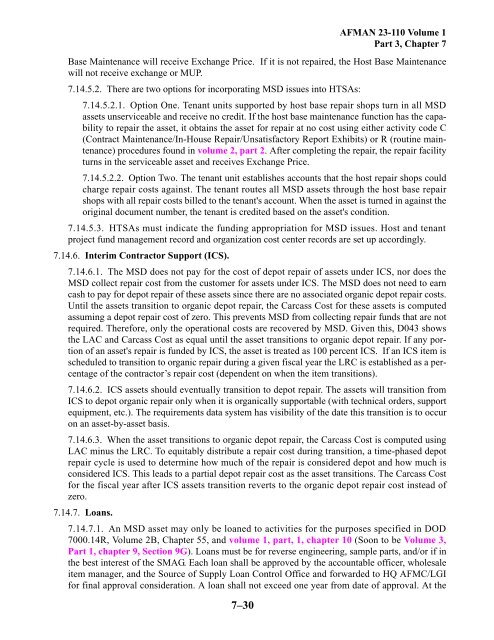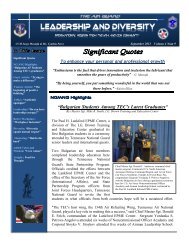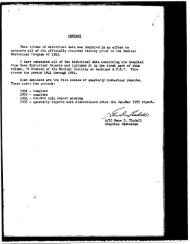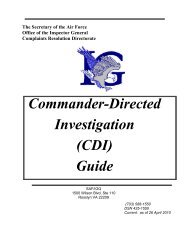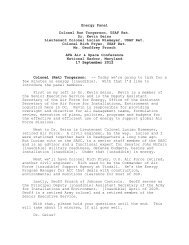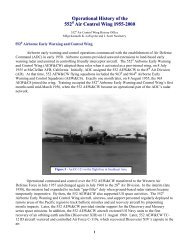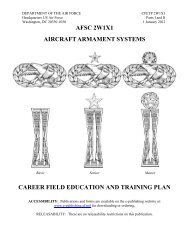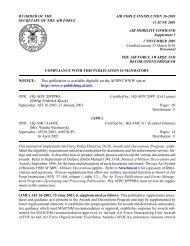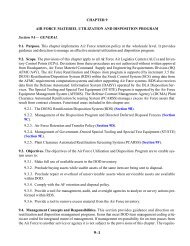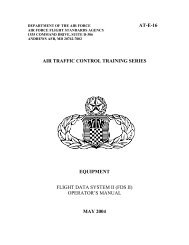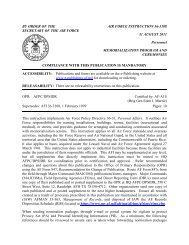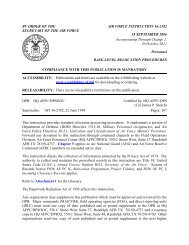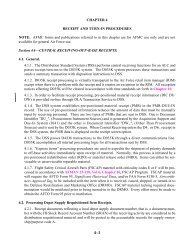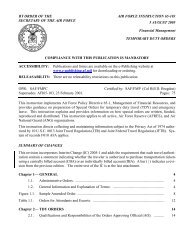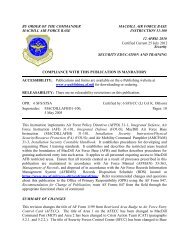Material support division, working capital fund - Air Force Link
Material support division, working capital fund - Air Force Link
Material support division, working capital fund - Air Force Link
You also want an ePaper? Increase the reach of your titles
YUMPU automatically turns print PDFs into web optimized ePapers that Google loves.
7–30<br />
AFMAN 23-110 Volume 1<br />
Part 3, Chapter 7<br />
Base Maintenance will receive Exchange Price. If it is not repaired, the Host Base Maintenance<br />
will not receive exchange or MUP.<br />
7.14.5.2. There are two options for incorporating MSD issues into HTSAs:<br />
7.14.5.2.1. Option One. Tenant units <strong>support</strong>ed by host base repair shops turn in all MSD<br />
assets unserviceable and receive no credit. If the host base maintenance function has the capability<br />
to repair the asset, it obtains the asset for repair at no cost using either activity code C<br />
(Contract Maintenance/In-House Repair/Unsatisfactory Report Exhibits) or R (routine maintenance)<br />
procedures found in volume 2, part 2. After completing the repair, the repair facility<br />
turns in the serviceable asset and receives Exchange Price.<br />
7.14.5.2.2. Option Two. The tenant unit establishes accounts that the host repair shops could<br />
charge repair costs against. The tenant routes all MSD assets through the host base repair<br />
shops with all repair costs billed to the tenant's account. When the asset is turned in against the<br />
original document number, the tenant is credited based on the asset's condition.<br />
7.14.5.3. HTSAs must indicate the <strong>fund</strong>ing appropriation for MSD issues. Host and tenant<br />
project <strong>fund</strong> management record and organization cost center records are set up accordingly.<br />
7.14.6. Interim Contractor Support (ICS).<br />
7.14.6.1. The MSD does not pay for the cost of depot repair of assets under ICS, nor does the<br />
MSD collect repair cost from the customer for assets under ICS. The MSD does not need to earn<br />
cash to pay for depot repair of these assets since there are no associated organic depot repair costs.<br />
Until the assets transition to organic depot repair, the Carcass Cost for these assets is computed<br />
assuming a depot repair cost of zero. This prevents MSD from collecting repair <strong>fund</strong>s that are not<br />
required. Therefore, only the operational costs are recovered by MSD. Given this, D043 shows<br />
the LAC and Carcass Cost as equal until the asset transitions to organic depot repair. If any portion<br />
of an asset's repair is <strong>fund</strong>ed by ICS, the asset is treated as 100 percent ICS. If an ICS item is<br />
scheduled to transition to organic repair during a given fiscal year the LRC is established as a percentage<br />
of the contractor’s repair cost (dependent on when the item transitions).<br />
7.14.6.2. ICS assets should eventually transition to depot repair. The assets will transition from<br />
ICS to depot organic repair only when it is organically <strong>support</strong>able (with technical orders, <strong>support</strong><br />
equipment, etc.). The requirements data system has visibility of the date this transition is to occur<br />
on an asset-by-asset basis.<br />
7.14.6.3. When the asset transitions to organic depot repair, the Carcass Cost is computed using<br />
LAC minus the LRC. To equitably distribute a repair cost during transition, a time-phased depot<br />
repair cycle is used to determine how much of the repair is considered depot and how much is<br />
considered ICS. This leads to a partial depot repair cost as the asset transitions. The Carcass Cost<br />
for the fiscal year after ICS assets transition reverts to the organic depot repair cost instead of<br />
zero.<br />
7.14.7. Loans.<br />
7.14.7.1. An MSD asset may only be loaned to activities for the purposes specified in DOD<br />
7000.14R, Volume 2B, Chapter 55, and volume 1, part, 1, chapter 10 (Soon to be Volume 3,<br />
Part 1, chapter 9, Section 9G). Loans must be for reverse engineering, sample parts, and/or if in<br />
the best interest of the SMAG. Each loan shall be approved by the accountable officer, wholesale<br />
item manager, and the Source of Supply Loan Control Office and forwarded to HQ AFMC/LGI<br />
for final approval consideration. A loan shall not exceed one year from date of approval. At the


